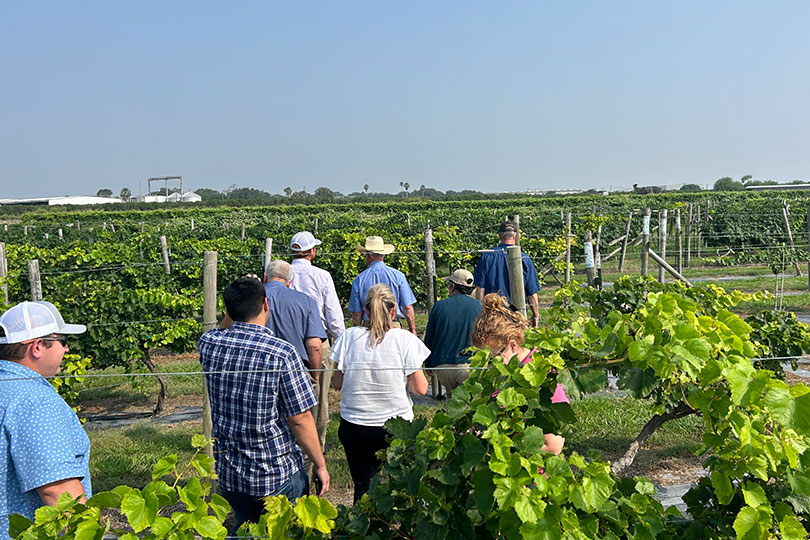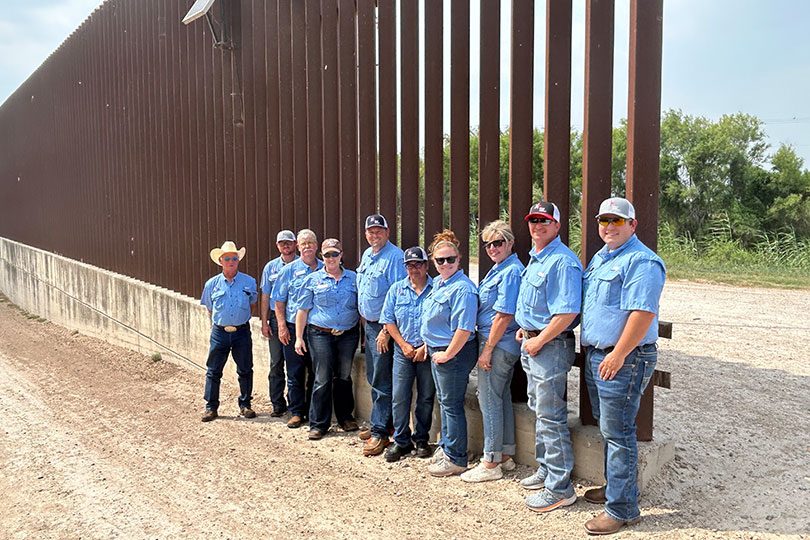By Emmy Powell
Communications Specialist
Texas Farm Bureau’s AgLead XVI returned home with new perspectives and connections after a four-day trip to the Rio Grande Valley in May.
The trip allowed the AgLead class to connect with farmers and ranchers in the Valley while discussing issues faced in the region including water, border security, labor, immigration and international trade.
The group toured the border, Rio Farms, Frontera Produce, Edinburg Economic Development Corporation, Lone Star Citrus, Green Gold Farms Inc., Armando Boots, Texas Citrus Mutual, and Old Hidalgo Pumphouse.
Much of the conversation during the tour centered on the lack of water and Mexico’s disregard for abiding by the 1944 Water Treaty.
“It’s disappointing to see Valley farmers and ranchers not getting support by our own government with the water situation and Mexico not adhering to the treaty,,” Dr. Anna Kantor, AgLead participant from Limestone County, said. “The issue was very prominent everywhere, every stop we made.”
In addition to the conversation about water, the Valley offered participants a look at a wide range of agriculture, thanks to its unique climate for vegetables to be grown year-round.
“What we saw was very different from what I have in Central Texas. I enjoyed learning more about fruits and vegetables and hearing from the farmers and ranchers in the region,” Kantor said.
The AgLead XVI group toured the border and met with farmers who are not only experiencing water issues but challenges with the border crisis, too. They are experiencing damaged property and constant monitoring for cattle fever ticks.
“We met with a rancher that’s right on the Rio Grande, and he’s having trouble with several things,” Michael Moon, AgLead member from Bell County, said. “He is facing issues with water, fever ticks and dealing with immigrants crossing the border illegally and damaging his property in the process. The deer and the wild cattle that come across the border brought fever ticks and hit his entire herd, and that’s devastating.”
The ticks are capable of carrying and transferring a disease commonly known as cattle fever, which can kill up to 90% of naive cattle infected. Once fever ticks are confirmed on a premises, an “infested quarantine” is issued for both the livestock and the premises, and ranchers must treat the cattle on 14-day or 28-day intervals for up to nine months.
The trip also gave the cohort the opportunity to discuss policy and international trade.
“AgLead helps people better themselves as far as knowledge, speaking, policies and agricultural advocacy,” Moon said. “It helps us understand the policies that members develop for Farm Bureau, and these experiences and visits help us learn how to be better leaders and advocates for agriculture.”
The trip was held May 13-16. The group is scheduled to travel to California in August.
AgLead is a two-year leadership development program that takes participants across Texas, the country and the world to discover agriculture and leadership from a new perspective.
For more information about TFB’s AgLead program, visit texasfarmbureau.org/aglead.



Leave A Comment